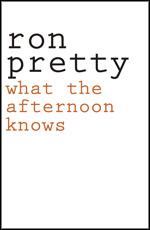
What the afternoon knows by Ron Pretty
Pitt Street Poetry, 2013
For Ron Pretty, the everyday is marvelously complicated. He’s in a hotel bar in Wales, the Welsh Dining Club is ‘eating out in a language rich and strange’, a birthday party is ‘agog with singing’, two young men are flirting with a blonde waitress ‘who shocks me with her flush / of free flowing hair’. Then, suddenly, he’s back in Junta-ruled Greece 40–odd years ago, involved with a young woman who, ‘behind closed windows’ is ‘singing for love, singing for freedom’ in a town with ‘rifles guarding the bakery’. Then back to Wales, and the two young men exit the bar holding hands with each other, not the waitress, who ‘takes my empty / memories and smiles as I too climb the stairs’.
This poetry is about complexity of the commonplace and mysterious connection. Pretty relishes humanity’s contradictions and frustrations. He’s on top of his craft, shrewdly observant, witty, practical rather than flashy, never tired.
‘Argini’, the poem noted earlier, is the fifth in the book, but themes of memory, age and ‘what’s underneath’ flourish from the start. The first poem, ‘Theseus At Eighty’, opens:
I am in the third level of irritation in the Library of Forgetting.
But under the white hair, other things are happening. The poem is as much about guilt and suppressed memory as imminent Parkinson’s disease:
There was a girl ... I am in the third age of irritation, this file is an accusation I do not wish to answer, a fiction I will never recall. Her face. The nightingale. I sailed away. Black sails.
Background knowledge of Theseus helps here as this poem is packed with the legend’s imagery, and readers who do not know that connection will miss a great deal. In the last two lines above, for instance, the short sentences are significant yet are not explained; it’s surprising that a poem with many external allusions was chosen to open the book. Still, it’s a striking piece. Typically, Pretty supplies enough information to make his poems self-contained and approachable to the reader (he is, after all, primarily about communication). He enjoys himself playing with tropes that invoke King Lear, Juliet, Lazarus, Rupert Brooke and Keats … yet, occasionally, the lines sag to a bit cheesy: ‘Hey, Rupert, I’ll brook no interference’, from ‘Rupert’.
Pretty’s modernist-tinged eye is cool and ironic, as in ‘From The Terrace’, a poem about transcendence (with a wink to Prufrock’s mermaids):
It is as I promised you. This calm night starlit, autumnal warmth, cars on the highway, streaming away for Easter, the neighbours screaming each to each, as is their love; and I, ensconced on the terrace, wine in my glass, in the silence ...
He watches the moon ‘bloated and rising’ with ‘silent cranking’ as it’s ‘levered across the eastern rim’. He sits ‘listening to the lies it has to tell me’, yet he’s at peace, ‘listening / intently as the first Adam in the silence’ …
Lyric is not his favoured mode. At times, Pretty forgets himself and abandons the wry, worldly edge, as is evident in the first half of the beautiful ‘Four Hands’:
There are such moments: once in Vienna looking out at that white winter while behind me four hands at the keyboard, Schubert and his magic shaping those crystals, a filigree of ice on the window tree. Evening was falling, the light was fading from his eyes, his minor key coughing blood onto the manuscript as the notes sang ...
The language is inventive and sharp throughout the book, but these poems have destinations, plenty to convey and believe in getting on with it. Beneath the conversational tone, a narrative drives.
The collection’s range is broad. There’s sly humour in ‘Barista: A Love Story’; Australian attitudes are satirised in ‘Anthem’ when ‘my anthem sings of citizens tired of politics / and all who threaten them with the future’; and apocalypse follows in ‘The Last Half Hour’.
What the afternoon knows arrives in three sections. The first is a wide-ranging collection of themes and style; reflective, humorous, occasionally fierce. The second is a sequence of 15 sonnets, also in a variety of styles, including typographical forms split into columns that can be read across or downwards. Section three opens with a fine series of poems on overseas adoptions from different points of view. In ‘Folders’, a Sri Lankan lawyer is handing to four anxious white couples the details of children whose impoverished mothers have agreed to give them up. In ‘Doubts’, an adoptive mother feels secret guilt. ‘Planes’ explores the loss felt by birth mothers who’ve surrendered their children. ‘Blue Movies’ catches the racist nastiness adoptive mothers can encounter in Australia as ‘a stranger’s face looms over the pram’:
Such a pretty little child. Is it yours? Your mother stiffens as she nods. The stranger looks again from parent to cinnamon child. Oh dear she says, the father must be devilish black ...
Apart from exploring contemporary legal and moral issues, poems in this section operate as metaphor for the randomness of life, birth, and have yet a third resonance – ruminating on Australia’s ‘stolen children’.
In a poem titled ‘Envoi’, Pretty begins with a Swedish proverb, ‘The afternoon knows what the morning never expected’. The poem reflects on life from his isolated childhood to the discovery of teaching and women (in random order), love and children and an afternoon full of writing. This is a rich collection from a life well examined.









